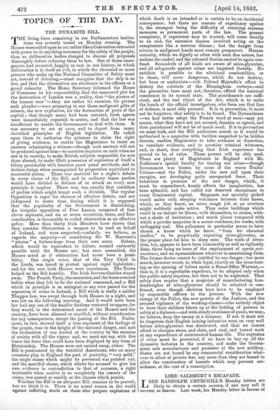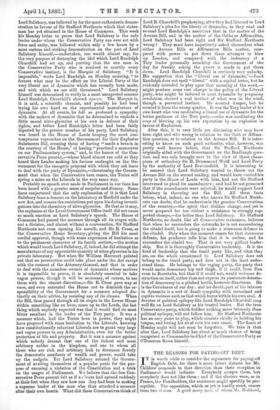LORD SALISBURY'S ESCAPADE.
TRANDOLPH CHURCHILL'S Monday letters are I likely to obtain a certain success, if one may call it success, as fiascos. Last week, his Monday letter in favour of Lord Salisbury, was followed by far the most enthusiastic demon- stration in favour of Sir Stafford Northcote which that states- man has yet obtained in the House of Commons. This week his Monday letter to prove that Lord Salisbury is the only leader under whom the Conservative Party can ever act with force and unity, was followed within only a few hours by a most curious and striking demonstration on the part of Lord Salisbury himself,—undertaken, one would almost say, for the very purpose of destroying the idol which Lord Randolph Churchill had set up, and proving that the one man in the Conservative Party who is resolved to mortify every Conservative instinct, is the Marquis of Salisbury. "It is impossible," wrote Lord Randolph on Monday morning, " to foresee what may be the effect on the Liberal Party of the very liberal use of dynamite which has recently been made, and with which we are still threatened." Lord Salisbury himself was determined to verify in a most unexpected manner Lord Randolph Churchill's shrewd apercu. The Marquis is, it is said, a scientific chemist, and possibly he had been trying his own hand on the experimental manufacture of dynamite. At all events, he felt so profound a sympathy with the makers of dynamite that he determined to explode a little moral nitro-glycerine of his own in defence of their rights, and before Lord Randolph's letter had been fairly digested by the greater number of his party, Lord Salisbury was heard in the House of Lords heaping the most con- temptuous reproaches on the Government for their Explosive Substances Bill, accusing them of having " made a breach in the courtesy of the House," of having " practised a manoeuvre on our Parliamentary system," and, to the horror of the Con- servative Peers present,—whose blood almost ran cold as they heard their Leader making his furious onslaught on the Go- vernment for the energetic proposal with which they ask leave to deal with the party of Dynamite,—threatening the Govern- ment that when the Conservative turn comes, the Tories will spring a mine on the Liberals in the very same way.
Probably no speech ever made in Parliament in our time has been heard with a greater sense of surprise and dismay. Some have conjectured that the only explanation of it is that Lord Salisbury fears a descent on the laboratory at Hatfield under the new Act, and resents the restrictions put upon his daring investi- gations into the chemistry of nitro-glycerine. Be that as it may, the explosion at the Local Government Office itself did not cause so much emotion as Lord Salisbury's speech. The House of Commons had passed the measure through all its stages with- out a division, and almost without a conversation, Sir Stafford Northcote not even opening his mouth, and Sir R. Cross, as the Conservative Home Secretary, giving the Bill his most cordial approval, though with some expression of hesitation as to the pernianent character of its fourth section,—the section which would touch Lord Salisbury, if, indeed, he did attempt the manufacture of any appreciable quantity of nitro-glycerine in his private laboratory. But when Sir William Harcourt pointed out that no prosecution could take place under the Act except with the consent of the Attorney-General, and that in order to deal with the nameless owners of dynamite whose motives it is impossible to prove, it is absolutely essential to take vague powers, though it will be necessary, of course, to use them with the utmost discretion,—Sir R. Cross gave way at once, and even entreated the House not to diminish the re- sponsibility of the Government for a measure adopted dis- tinctly on their advice, by resisting any of its clauses. When the Bill, thus passed through all its stages in the Lower House within something like an hour, came up to the Lords, the last thing which anybody expected was that it would find most bitter assailant in the leader of the Tory party. It was a measure which, had the Tories been in power, they might have proposed with some hesitation to the Liberals, knowing how constitutionally reluctant Liberals are to grant very large and vague powers to any Administration, even for the better protection of life and property. But it was a measure against which nobody dreamt that one of the richest and most arbitrary nobles in the kingdom, and one to whom all those who are rich and arbitrary look to denounce fiercely the democratic assailants of wealth and power, would take up the cudgels. Yet Lord Salisbury accused the Govern- ment of availing themselves of a popular panic for the pur- pose of excusing a violation of the Constitution and a trick on the usages of Parliament. VC e believe that the few Con- servative Peers present felt as if a Chasm had opened suddenly at their feet when they saw how nea they had been to making a supreme leader of the man who thus attacked a measure after their own hearts. What did these Conservatives think of
Lord R. Churchill's prophesying, after they had listened to Lord Salisbury's plea for the liberty of dynamite, as they read and re-read Lord Randolph's assertions that in the matter of the Arrears Bill, and in the matter of the Oaths or Affirmation, Lord Salisbury had been right and Sir Stafford NorthoOte wrong ? They must have impatiently asked themselves what either Arrears Bills or Affirmation Bills matter, com- pared with power to put down these attempts to blow up London, and compared with the indecency of a Tory leader personally attacking the Government of the day for frankly asking the power it needs to put them down. Lord Randolph Churchill is certainly very unlucky. His suggestion that the "liberal use of dynamite,"—Lord Randolph does not spell " liberal " with a capital letter, but he evidently intended to play upon that meaning of the word,— might produce some vast change in the policy of the Liberal party, who might be induced to meet dynamite by proposing revolution, showed a real instinct of what was in the wind, though a perverted instinct. He scented danger, but he scented it from the wrong quarter. It was the Tory leader of his own heart who was meditating a liberal use of dynamite for the better guidance of the Tory party,—who was meditating the coup of blowing up his own reputation by an explosion in favour of Explosives.
After this, it is very little use discussing who may have been right and who wrong in relation to the Oath or Affima- tion question, or in relation to the Arrears Bill. It is inter- esting to know on such good authority, what, however, was pretty well . known before, that Sir Stafford Northcote originally sided with the Government on the Bradlaugh ques- tion, and was only brought over to the view of those cham- pions of orthodoxy Sir H. Drummond Wolff and Lord Percy by the authority of Lord Beaconsfield. It is interesting to be assured that Lord Salisbury wanted to throw out the Arrears Bill on the second reading, and would have carried his party in the House of Lords with him, had not Sir Stafford intervened to plead for amendments ; and had he not promised that if the amendments were rejected, he would support Lord Salisbury in throwing out the Bill. All these facts betray, what, indeed, no one who knows Sir Stafford North- cote can doubt, that he understands the genuine Conservatism of the country,—the spirit that dislikes change, and yet is never prepared for too violent a resistance to strongly sup- ported change,--far better than Lord Salisbury. Sir Stafford Northcote, no doubt, like all Conservative statesmen, believes that when he surrenders the outworks he is not surrendering the citadel itself, but is going to make a strenuous defence in the citadel. Only when the moment comes for that strenuous defence, his prudence tells him that it is useless, and he surrenders the citadel too. That is not very gallant leader- ship. But it is thoroughly Conservative leadership. It is the kind of leadership that the timid party like, and what they are, on the whole accustomed to. Lord Salisbury does not belong to the timid party, and does not in the least under- stand them. He belongs to the raging party, the party that
would smite democracy hip and thigh, if it could, from Dan even to Beersheba, but that if it could not, would welcome de- struction on itself, rather than not express its passionate detesta-
tion of democracy in a pitched battle, however disastrous. He is the Coriolanus of our day; and no doubt, part of his interest in dynamite is a sort of dumb sympathy with restrained and captive violence such as that which burns within his own soul. A devotee of political epilepsy like Lord Randolph Churchill may well fix on Lord Salisbury as his trusted leader. But the true Conservative party, which dislikes nothing more intensely than
political epilepsy, will not follow him. Sir Stafford Northcote has an easy game to play, which consists chiefly in holding his tongue, and letting his rival ruin his own cause. The fiasco of Monday night will not soon be forgotten. We take it that after that, Lord Salisbury has about as much chance of being recognised as Commander-in-Chief of the Conservative Party as O'Donovan Rossa himself.



































 Previous page
Previous page